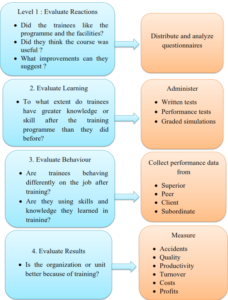Evaluation of Training Programme
The last stage in the training and development process is the evaluation of training. Since huge sums of money are spent on training and development, how far the programme has been useful must be judged.
According to Hamblin
Evaluating training is any attempt to obtain information(feedback) on the effects of a training programme and to assess the value of the training in the light of that information.
According to Warr
Evaluation is the systematic collection and assessment of information for deciding how best to utilize available training resources in order to achieve organizational goals.
Need for Evaluation
- To determine whether the specific training objectives are accomplished or not.
- To ensure that any changes in trainee capability are due to the training programme and not due to any other conditions.
- To identify which trainees benefit most or least from the programme.
- To determine the financial benefits and costs of the training programme.
- Credibility of training and development is greatly enhanced when it is proved that the organization has been benefited tangibly from it.
- Evaluation is critical not for assessing quality of training, but also to see that future changes in training plan should be made to make it more effective, and achieve goals of the organization.
- To compare the costs and benefits of training versus non- training investments like work redesign etc.
Principles of Evaluation
Evaluation of the training programme must be based on the following principles:
- Training faculty must be clear about the goals and purposes of evaluation.
- Evaluation must be continuous.
- Evaluation must be specific.
- Evaluation must provide the means and focus for trainers to be able to appraise themselves, their practices and their products.
- Evaluation must be based on objective (quantitative) methods and standards.
- Realistic target dates must be set for each phase of the evaluation process.
- Evaluation must be cost effective.
Evaluation Criteria
Evaluation of training effectiveness is the process of obtaining information on the effects of a training programme and assessing the value of training in the light of that information. Evaluation involve controlling and correcting the programme. The basis of evaluation and mode are determined when the training programme is designed. According to Hamblin training effectiveness can be measured in terms of the following criteria:
- Reactions
A training programme can be evaluated in terms of the trainee’s reactions to the objectives, contents and methods of training. In case the trainees considered the programme worthwhile and like it, the training can be considered effective.
- Learning
Learning measures assess the degree to which trainees have mastered the concepts, knowledge and skills of the training.
- Behaviour
Improvement in the job behavior of the trainees reflects the manner and extent to which the learning has been applied to the job.
- Results
The ultimate results in terms of productivity improvement. quality improvement, cost reduction. accident reduction, reduction in labour turnover and absenteeism are the best criteria for evaluating training effectiveness.
The following figure provides a broad framework for evaluation in terms of types, levels and methods. However, it may not always be possible to employee a comprehensive evaluation system due to organizational constraints e.g.
- Lack of clear training policy
- Inadequate infrastructure
- Unwillingness of the management to change human resource policies
- Performance appraisal system
- Organizational processes on the basis of feedback
Methods of Evaluation
Several methods can be employed to collect data on the outcome of training. Some of these are:
- The opinions and judgments of trainers, superiors and peers,
- Asking the trainees to fill up evaluation forms,
- Using a questionnaire to know the reactions of trainees,
- Giving oral and written tests to trainees to ascertain how far they have learnt,
- Arranging structured interviews with the trainees.
- Comparing trainees performance on-the-job before and after training,
- Studying profiles and career development charts of trainees.
- Measuring levels of productivity, wastage. costs, absenteeism and employee turnover after training.
- Trainees’ comments and reactions during the training period, and
- Cost benefit analysis of the training programme.


